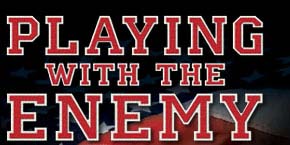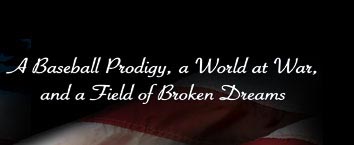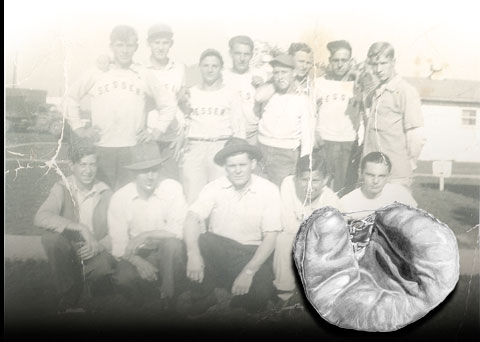|
A man reconnects with his father through book on his life
SESSER - As Gary W. Moore sat across from his 57-year-old father at a Chicago steakhouse some 20 years ago, he admitted over lunch that he was scared.
Gene Moore was in the city to see a heart specialist. The 29-year-old Gary realized there may not be much time left.
"There are a lot of things I want to ask you," Gary told his father.
"Like what?" Gene asked.
"Like why you never came to watch me play baseball."
Gary's father had always been his biggest fan, cheering him on at drum and bugle corps and never missing a sports game - unless it was baseball. If the subject came up, Gene would say to his son in a serious tone, "There are more important things in life than baseball."
It was a mystery to Gary, who had a natural love for the game, why his father seemed so cold about it.
Gene paused and then consented. "Ok, let me tell you about my life in baseball."
A father's incredible story
The year was 1939, and a local baseball legend was shaping up in Sesser. Fans came from miles to watch the 15-year-old catcher, Gene Moore, dominate the game. Gene played for the Wing Lumber team, and he dubbed the diamond "the Lumberyard."
A veteran scout for the Brooklyn Dodgers picked up on Gene's talent and signed him to play for the St. Louis Granary Team a year later.
Recruitment seemed imminent for the Sesser farm boy who loved baseball more than anything in the world. But a funny thing happened on the way to the Major Leagues: Pearl Harbor.
Gene traveled to North Africa playing for the Navy baseball team, but his country would need him for a greater mission. A German submarine, the U505, had been captured and Gene's unit was sent to guard the POW's at Camp Ruston, La.
Gene organized a baseball team and taught some of the German prisoners to play. (Records show the only activity listed for these POW's was work at "The Lumberyard." There was no lumberyard in Ruston. It appears Gene's code word for a baseball field found its way into history.)
After Gene finished telling his story to his son, Gary sat in awe of his father and how he could have kept this secret from even his closest family.
The father and son left the steakhouse with plans to meet at Gene's home for dinner. Gene Moore died before his son arrived that evening.
A mother's dying wish
Years past and the story told by Gary's father faded into the background of a busy life. Gary, now 50, built his own family of three children and an international water product business, Aquativa.
In 2002 as Gary's mother, Judy, struggled with a slow and agonizing death from emphysema, she came to her son with a strange request. "Write a book about your dad's life."
"I don't know who would be interested, but it could just be something we passed from generation to generation," Gary told her.
"There are things about your father's life you don't know," Judy responded.
The other half of the story unfolded when the war ended. Gene helped organize a friendship game with the freed POW's. While the game marked a new era of peace between Germans and Americans, it foreshadowed the end of Gene's baseball career. During the game, he twisted his ankle irreparably.
With the loss of his dream, Gene fell into a bitter depression, drowning his sorrows in alcohol. But the friends he had made in baseball wouldn't let him fall.
One such Navy baseball buddy helped Gene get recruited to a minor league farm team for the Pittsburgh Pirates. Gene's ankle ensured that he would never make it further in his career. Gene's friend - whose name does not appear by request of the family - did go on to become a famous major leaguer.
Gene's resentment returned when he was let go from the farm team. Judy found him on the floor of the Southern Illinois bar where she worked. Together, Judy and Gene built a happy life and successful business on new, shared dreams.
The death of Gary's mother, Judy, came soon after her request for him to write the book. Gary felt that writing it was a way to honor both of his parents' memories.
He began retracing the steps of his father and digging into WWII history. He visited the U505 at its current home in the Chicago Museum of Science and Industry, and he contacted the Pirates for any information on his father.
As he researched and wrote, he connected with his parents in a new way.
"You know your parents and you love them, but it's another thing when you start putting their lives on paper. It makes you realize what special people they are," said Gary, as he sat in a Sesser restaurant on a recent afternoon.
"I agree with Tom Brokaw. They are the Greatest Generation. I think it's amazing as much pain as he went through, we kids never knew it. He didn't feel sorry for himself. He didn't complain about his lot in life. We had to find out from other people what he had been through."
A son's gift
Gary's son, Toby Moore, also took a strong interest in the project. Toby is a professional actor who has starred in the Showtime movie "A Separate Peace," USA Network movie "Murder in Greenwich," and episodes of "CSI Miami" and "Law and Order SVU."
"I thought it was such an amazing story that we could turn it into film," Toby said. "It's started to get a lot of attention. My dad's been out here for a couple meetings with some producers, and I know they're interested. We're trying to figure out the best possible way to make the film so I can play my grandfather."
The handsome young actor bears a striking resemblance to the grandfather he hopes to play in the movie. By his portrayal, Toby believes he will connect with his grandfather in the way his father, Gary, connected during the writing of the book.
"It would mean the world to me," Toby said of portraying Gene. "I never really knew my grandfather because he died when I was very young."
For Toby, it's also a way of honoring his own father, Gary.
"It would mean a lot more to my dad," he says. "I know it's been a really emotional piece to work on for him."
A father's legacy
As Gary finishes the novel, he admits letting go will be hard.
"When I started writing, suddenly they were alive again," Gary says of his parents.
However, Gary realizes that the book, like his father, will take on its second life now.
The attention "Playing with the Enemy" is receiving surprised even Gary. But he believes he knows the secret of the book's burgeoning success.
"The story is really important for people who place everything in their dreams," Gary says. "It's important to dream, but with the understanding that things don't always work out the way we want them to. Sometimes we have to change our dreams."
Gene's life story is more compelling than the archetypal American hero tale because he dreams and loses. In Gene's failure to reach fortune and fame, he is forced to re-evaluate what success means. Gene comes to understand that worldly accomplishment is not the answer. He sees his greatest achievement as raising the family he would have never known if he had made it to the Major Leagues.
"There are more important things in life than baseball," Gene would always tell his son. Now Gary knows exactly what his dad meant.
Sign up to receive the monthly Playing With The Enemy Newsletter
|


 www.PlayingWithTheEnemy.com
www.PlayingWithTheEnemy.com





